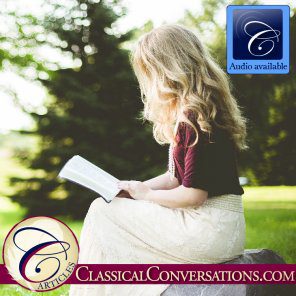Recently my husband and I had the opportunity to help one of our adult children. Because of some honest mistakes, followed by a few poor choices, our daughter was faced with an unexpected expense that she could not handle alone. As we were discussing what we could do and considering what we should do, I began to entertain the thought, “What is reasonable? What is the minimum we should do?”
When I was new to homeschooling I remember thinking, “What is the minimum amount of curriculum I need and what is the minimum amount I can possibly spend?” Of course, saving money and practicing wise stewardship is not wrong and was certainly beneficial to our family budget the few months my husband was between jobs. But somewhere along the way, doing the minimum possible had become a compulsion for me. I was leaning toward miserliness and forsaking generosity.
Experience has taught me that wise stewardship and spending the least amount possible are not mutually exclusive. There are situations where asking the question “how little can I do” becomes obviously ridiculous. For instance, a parent would not ask, “What is the minimum I can feed this child and still keep him alive?” or “What is the minimum driving experience I can give my teen before they can head out on their own?” (Well, I may have thought this when teaching child number five to drive, but I repented of it later!) Literature feeds the soul, nurtures character, influences worldview, and trains the mind in orderliness and godliness. Why would I ever want to focus on the minimum? A better question would be “What is the best I can give my children from the resources available to me?”
It doesn’t take long to discover that there are many literature sources available to today’s homeschoolers! For listening or downloading to read later, our family has enjoyed free online sources such as LibriVox and Project Gutenburg as well as the subscription-based Audible. For trips to the library, we use books lists such as Honey For a Child’s Heart and Honey for a Teen’s Heart to help our children make informed choices. These are book lists that recommend titles for children of various ages and reading levels, while providing a short summary of the story line—perfect for the busy mom who can’t seem to keep up with all the avid readers in her home! For building one’s own fiction library, our family favorite is Lamplighter Publishers. Their Rare Collector’s Series includes restored Christian family literature written from the 17th-20th centuries. Each story is packed with action and a character-building story line. But the books that take up most of the room on our shelves are our beloved Classical Conversations books. From Foundations through Challenge IV, these are the most utilized books we own—and the most likely to go missing when one the kids moves out or heads off to college. I can feel good about purchasing these materials from a company who shares my values and promotes homeschooling around the world.
Reading, studying, and discussing quality literature with my children for the past two decades has helped me formulate better questions. While pondering how to help my adult daughter, I was reminded of God’s response to fallen mankind. Man had sinned and was in desperate need. We were enslaved by our own choices and the consequences we faced were grievous—eternal separation from God. God had opportunity to help. As I reflected on God’s response to mankind, I was very thankful in that moment that God did not ask “What is the minimum I can do?” or even “What is reasonable?” Instead, He asked, “What is needed?” Indeed, God’s response to our need was empirically unreasonable—beyond reason, extraordinary. Extravagant.
The questions I have been thinking on lately are: How will God’s response toward me affect my generosity and the way I extend grace to others? How I care for my family and love my neighbor? The way I homeschool? What is needed?
“…in that while we were sinners Christ died for us.” Romans 5:8




